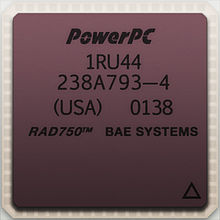RAD750

The RAD750
|
|
| Produced | From 2001 to Present |
|---|---|
| Designed by | IBM |
| Common manufacturer(s) | |
| Max. CPU clock rate | 110 MHz to 200 MHz |
| Min. feature size | 250 nm to 150 nm |
| Instruction set | PowerPC v.1.1 |
| Microarchitecture | PowerPC 750 |
| Cores | 1 |
| L1 cache | 32 KB instruction + 32 KB data |
| Predecessor | RAD6000 |
| Successor | RAD5500 |
| Application | Radiation hardened |
The RAD750 is a radiation-hardened single board computer manufactured by BAE Systems Electronics, Intelligence & Support. The successor of the RAD6000, the RAD750 is for use in high radiation environments experienced on board satellites and spacecraft. The RAD750 was released in 2001, with the first units launched into space in 2005.
The CPU has 10.4 million transistors, nearly an order of magnitude more than the RAD6000 (which had 1.1 million). It is manufactured using either 250 or 150 nm photolithography and has a die area of 130 mm2. It has a core clock of 110 to 200 MHz and can process at 266 MIPS or more. The CPU can include an extended L2 cache to improve performance. The CPU itself can withstand 200,000 to 1,000,000 rads (2,000 to 10,000 gray), temperature ranges between –55 °C and 125 °C and requires 5 watts of power. The standard RAD750 single-board system (CPU and motherboard) can withstand 100,000 rads (1,000 gray), temperature ranges between –55 °C and 70 °C and requires 10 watts of power.
The RAD750 system has a price that is comparable to the RAD6000 which is US$200,000 per board (per 2002 reference). However customer program requirements and quantities will greatly affect the final unit costs.
The RAD750 is based on the PowerPC 750. Its packaging and logic functions are completely compatible with the PowerPC 7xx family.
...
Wikipedia
